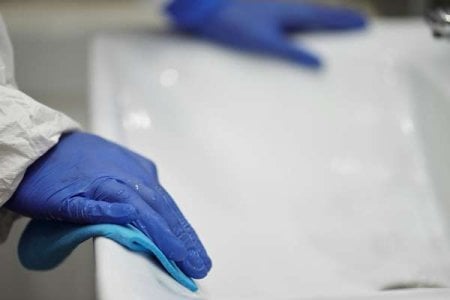Health officials reveal one often overlooked household task that could put homes at risk for Legionnaires' disease
By
Danielle F.
- Replies 5
In the midst of a concerning outbreak of Legionnaires' Disease, Australians were urged to pay close attention to the cleanliness of their surroundings.
Recently, scientists started pinpointing hotspots within our homes that may be contributing to the risk.
Legionnaires' disease is a severe form of pneumonia that has been making headlines lately.
It has spread rapidly through Melbourne, prompting a swift response from authorities.
Flinders University Microbiologist Claire Hayward highlighted the risks that people, especially senior citizens, face at home from unassuming places.
'We found that the biofilms—slimy bacterial growth found on the drains of hand washing basins—have a really complex community of bacteria,' Dr Hayward shared.
Flinders University's groundbreaking research also suggested that hand basins may play a significant role in healthcare-associated infections.
While some bacteria in these biofilms are harmless, others could pose a public health risk, particularly to senior citizens, newborn children, and the immunocompromised.
The shift towards home healthcare as an alternative to hospital stays inadvertently increased the risk of exposure to pathogens.
Services like chemotherapy and post-surgical care are now often done at home for patient comfort.
Yet, this also means that the home environment should be clean and sterile to prevent infections.
Dr Hayward also explained that when water from a tap hits the drain, it can dislodge parts of the biofilm and create aerosols.
These tiny droplets, which contain bacteria, could be inhaled and lead to illnesses.
While Legionnaires' Disease is the primary concern, it's not the only risk.
Dirty drains could also harbour bacteria like staphylococcus, which can cause wound infections, among others.
In recent news, a Melbourne local passed away due to Legionnaires' disease, touted as Victoria's worst outbreak in 20 years.
People over 40, smokers, and those with weak immune systems are particularly at risk for Legionnaires' Disease.
However, Dr Hayward reassured that the biofilms on drains are not a significant threat to healthy individuals.
To keep these risks at bay, she advised those receiving healthcare treatment at home to clean their basins and disinfect surfaces thoroughly.
Dr Hayward's warnings serve as a reminder of the importance of maintaining cleanliness in our homes, especially in areas we might overlook.
Simple steps like regular disinfection of hand basins could make a significant difference in protecting ourselves and our loved ones from hidden health hazards.

Have you cleaned your basins at home recently? What other areas in our homes should we clean thoroughly to prevent the spread of diseases? Share your cleaning tips and strategies with us in the comments section below.
Recently, scientists started pinpointing hotspots within our homes that may be contributing to the risk.
Legionnaires' disease is a severe form of pneumonia that has been making headlines lately.
It has spread rapidly through Melbourne, prompting a swift response from authorities.
Flinders University Microbiologist Claire Hayward highlighted the risks that people, especially senior citizens, face at home from unassuming places.
'We found that the biofilms—slimy bacterial growth found on the drains of hand washing basins—have a really complex community of bacteria,' Dr Hayward shared.
Flinders University's groundbreaking research also suggested that hand basins may play a significant role in healthcare-associated infections.
While some bacteria in these biofilms are harmless, others could pose a public health risk, particularly to senior citizens, newborn children, and the immunocompromised.
The shift towards home healthcare as an alternative to hospital stays inadvertently increased the risk of exposure to pathogens.
Services like chemotherapy and post-surgical care are now often done at home for patient comfort.
Yet, this also means that the home environment should be clean and sterile to prevent infections.
Dr Hayward also explained that when water from a tap hits the drain, it can dislodge parts of the biofilm and create aerosols.
These tiny droplets, which contain bacteria, could be inhaled and lead to illnesses.
While Legionnaires' Disease is the primary concern, it's not the only risk.
Dirty drains could also harbour bacteria like staphylococcus, which can cause wound infections, among others.
In recent news, a Melbourne local passed away due to Legionnaires' disease, touted as Victoria's worst outbreak in 20 years.
People over 40, smokers, and those with weak immune systems are particularly at risk for Legionnaires' Disease.
However, Dr Hayward reassured that the biofilms on drains are not a significant threat to healthy individuals.
To keep these risks at bay, she advised those receiving healthcare treatment at home to clean their basins and disinfect surfaces thoroughly.
Dr Hayward's warnings serve as a reminder of the importance of maintaining cleanliness in our homes, especially in areas we might overlook.
Simple steps like regular disinfection of hand basins could make a significant difference in protecting ourselves and our loved ones from hidden health hazards.
Key Takeaways
- Australian health officials are containing an outbreak of Legionnaires' Disease, which has already reported some fatalities.
- Microbiologist Claire Hayward of Flinders University warned that hand basins in homes could be 'hotspots' for harmful bacteria, increasing the risk of infections.
- Backing research also suggested that biofilms on hand basin drains could contain pathogenic bacteria, posing risks of inhalation and subsequent infection.
- People receiving healthcare treatment at home were advised to thoroughly clean their hand basins and surfaces to minimise the risk of infections and diseases.








